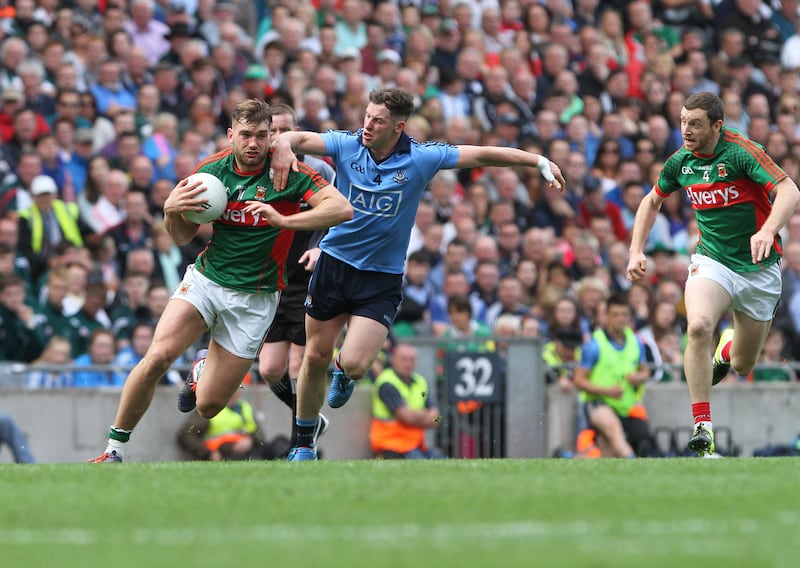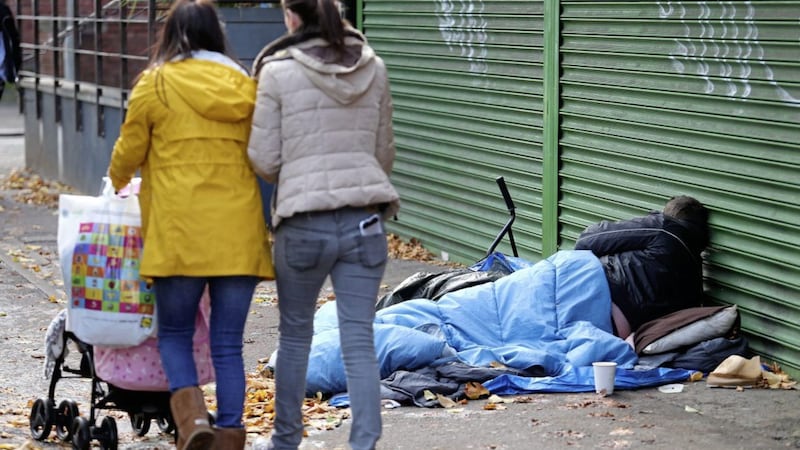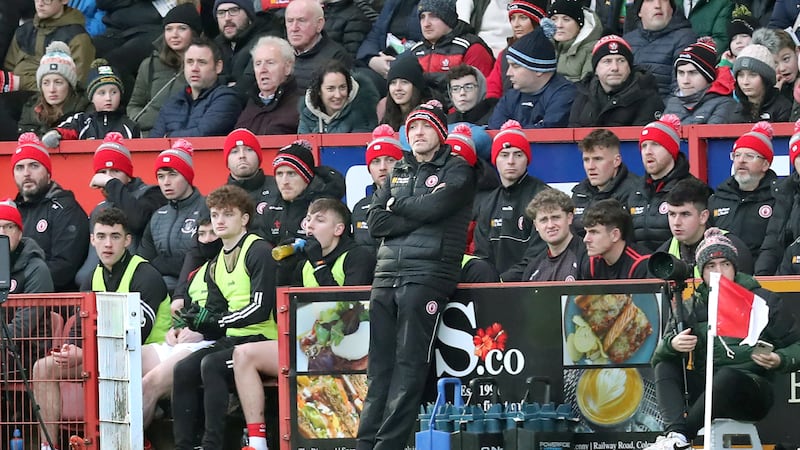ON Thursday night, Erica Fleming tweeted a picture of her 11-year-old daughter Emily fast asleep with the two dogs on top of the bed with her, with the caption “it’s the #littlethings”.
They had been homeless for 22 months before accommodation finally came their way in April. For almost two years, she and her daughter had lived out of hotel rooms.
Erica’s daily routine consisted of the “embarrassment” of leaving the hotel with Emily dressed in her uniform, knowing that anyone who saw them would know they were homeless, before dropping her little girl off to school and heading to work.
She worked 29 hours-a-week and would leave early every day so that she could get on the phone to hotels and shelters to secure a room for the night.
Sometimes the call would come at 10pm, telling her to drive to Louth. With no cooking facilities, they lived off takeaway food and then shared a bed. No space even to cry. The next morning, the cycle would start over.
In the very loosest sense, they were perceived as being among the lucky ones because they got a bed at night.
With winter setting in hard, two men perished on the streets of Dublin this week alone.
One was an Irishman in his late 50s, described as “particularly vulnerable” and sleeping rough in a tent behind a hedge in Ranelagh. The temperature was three degrees the night before he passed away.
He was on a priority list to be housed but could not be due to the lack of one-bed dwellings. And so we, as a nation, just left him to die.
The other was a Lithuanian man who had also been engaging with homeless services since 2013. He was found unresponsive at 8pm on Monday night, with initial indications that he may have died of a drug overdose.
Those deaths brought the total in Ireland to seven in the last 12 weeks alone. Between the inactivity of politicians in the north and the ongoing squabbles in the south, “the finger has gone off the pulse in every Government department for the past week,” said Inner City Helping Homeless director Anthony Flynn.
Ireland, north and south, is in the very depths of a homelessness crisis. Almost 12,000 people in the north were accepted as being “statutorily homeless” over the last year.
Almost 1,500 more cases (39.7 per cent) of homelessness were reported in Northern Ireland in the first few months of 2017 compared to the previous quarter.
In October, there were 8,492 people, some 3,194 of them children, registered as homeless in the Republic.
88 new families are among them as of October alone. Parents with young children, in the mouth of Christmas, who’d be happy to survive the night with a bit of heat and a scrap of food rather than concern themselves with which version of the iPhone to buy.
In the mind’s eye you see a starving Frank McCourt licking the taste of uncle Pa’s fish and chips off the newspaper wrapping in Angela’s Ashes. The reality for some is not at all removed from the 1930s.
*
A STUDY in February this year, based on statistics from the International Monetary Fund, ranked Ireland as the seventh richest country in the world based on GDP per capita.
But it’s a nation of haves and have-nots.
Because Ireland also has the highest rate of homeless children in Europe. There has been a 2,500 increase (24 per cent) in the number of homeless people since last February.
There are over 1,100 homeless families in Dublin alone, though almost half of those without a home are under the age of 24.
There’s an average of six rough sleepers per night in Belfast, and in November there were 184 people sleeping rough in Dublin, all despite the fact that there are currently an astonishing 183,312 vacant dwellings in the Republic.
The ruthless rental market, particularly in Dublin, has forced many – even in some cases those in employment - from their homes because they simply cannot afford to stay.
It’s become the blackest stain on the character of an island that is universally regarded for its generosity. Charity is sometimes better begun at home.
The statistics are beyond bleak but there’s a tendency to view such numbers as just that. Like 1.5million gun deaths in America since 1968, or 400,000 killed in the war in Syria, or even the million that died in our own famine, it’s stark but impersonal.
It’s sometimes only when it becomes humanised that it hits home.
And so for former Dublin footballer Eamon Fennell, who along with ex-Wexford hurler Diarmuid Lyng is guiding the Gaelic Voices For Change group that will do a sleepout around Ireland on December 16, it was from meeting people like Erica that his mind really focussed.
“Speaking to Erica, her ordeal on a day-to-day basis, that hit me harder than any of the stats I’ve read. She’s living it, experiencing it day to day to day. It’s that kind of stuff that inspires you to do a bit more,” he told The Irish News.
“We met a few families as well and it’s heartbreaking. For me, I’ve been very fortunate in my life to have amazing opportunities and to want for very little.
“For a kid living in a hotel room, you can’t cook food. Your physical health suffers. Then the mental health suffers, the kid becomes unbalanced and goes to school and doesn’t want to speak.
“It’s absolutely crazy to think there are families and young kids on the street. That’s the hard-hitting part for me. To see young kids on the street coming up to Christmas, the most joyful time of the year, is frightening."
**
IN just over two weeks’ time, a group of GAA players past and present will do what they can to help aid the crisis.
In nine different venues across Ireland – namely Belfast, Dublin, Galway, Cork, Waterford, Carlow, Portlaoise, Sligo and Wexford – they aim to generate solidarity with those on the streets by staying out from 6pm until 6am.
Among them will be the Dublin and Laois hurling squads, the latter going a night earlier as they have training on the 16th.
In the Ulster contingent, the likes of Antrim quartet Ciaran Johnston, Conor Murray, Domhnall Nugent and Patrick Gallagher; Cavan’s Seanie Johnston; Armagh ladies’ footballer Caroline O’Hanlon; Down’s All-Ireland winning legend Ross Carr. The recruitment drive is ongoing.
There is also the aim of fundraising behind it. Having spoken to Old Belvedere College, who have been doing this for 20 years and now annually hit the €200,000 mark, the bar is set, but this is very much a fledgling adventure that might have to walk before it runs.
“We were talking about doing something in Croke Park, maybe opening it to kids and families, but to us it was more about there are people living on the street and until you walk in their shoes, you really don’t know what it is they’re going through,” said Fennell.
“It’s obviously just one night, it’s a flash in the pan and nothing compared to those people, but it gives you a bit of an understanding of what they’re going through on a day-to-day basis.
“We just wanted to do the sleepout, get people to experience it and that might channel their minds a bit differently to getting involved, and a bit more of a grá to make a change.”
*
COMING from Coolock on the northside of Dublin, there have been social issues not far from his doorstep all through his life but since Gaelic Voices For Change began this process three months ago, Fennell has been on a voyage of discovery.
One of the more surprising elements he’s found is the demographic of people who are being housed in shelters, hostels and hotels.
“90 per cent of homeless people come from the rental market. Rents go up, they get evicted, and you lose your house and your job.
“To have a strong mind is one thing, but that’s a very slippery slope from having a job and a home to living on the street, maybe not talking to your family.
“I was surprised to see that there were businessmen and women who were homeless, who had been thrown out of their rental accommodation and they’re putting a face on. They won’t open up, they can’t say to people, and they’re going to work every day but they’re living on the street.
“They still have a job but that’s when you start on the slippery slope. You can’t get accommodation, you’re struggling, and your mindset changes, work starts to suffer and you maybe lose your job.
“There obviously is a stigma attached. Honestly, I would probably have been a bit naïve before I got involved with the group about understanding the whole situation.
“You can see how people do get involved and fall by the wayside and get involved with drink and drugs. If people get involved with drink and drugs because of homelessness, it’s not because they ever had an intention to do so.
“We’ve talked to too many people and seen the scenario present itself too many times.
“I know one or two people that have been made homeless, but I promise you, people will know someone in that situation, they just don’t know that they know.
“There are people out there putting a brave face on, living in shelters, sleeping rough or in their cars because they can’t rent accommodation. And those are the better circumstances, where people have a job and have income, but they just can’t get accommodation.”
In a country where the politicians are failing woefully at the bread and butter on both sides of the border, the players involved have no obligation to become social martyrs but, in highlighting the work of men like Philly McMahon on the drugs issue, Alan O’Mara and Kevin McManamon on mental health and Alan Kerins and Joe Canning in Africa, there was a realisation of the power to do good that the collective holds.

“The real think-tank we had initially was that there were so many people within the GAA doing amazing stuff.
“When we looked at it, there were a lot of individuals doing amazing work, but as a collective, weren’t probably doing enough.
“We said if we really pulled together, we could make a massive difference, but we need to get a real core group of people together and try to do something initially and cast the net a bit further after that.”
Every child, and every adult for that matter, deserves the little things like Emily Fleming had last night, snug beneath the Christmas duvet with her family around her.
Whatever comes of this gesture, be it increased awareness, financial help for the homeless or even a heavy nudge on the political powers to do more, it will only have been a start.
But if that start takes one person off the streets, keeps one person out of a whirlpool from which there can be no escape, saves one life, well then it will have been worth it.
THE HOMELESSNESS CRISIS
- Ireland has the highest number of homeless children in Europe. More than one in three people living in emergency accommodation is a child
- Almost 1,500 more cases (39.7 per cent) of homelessness were reported in Northern Ireland from January-March 2017 compared to the previous quarter
- There has been a 24 per cent increase in the number of homeless in the Republic since last February
- The national figures for homelessness don’t include “hidden homeless”, which is people that don’t register as homeless
- 46.5 per cent of homeless in the Republic are under the age of 24
- There are an average of six rough sleepers in Belfast every night
- In October, there were 8,492 people, some 3,194 of them children, registered as homeless in the Republic.
- 88 new families are among them as of October alone
- As of September, there were 183,312 vacant dwellings in the Republic
GAELIC VOICES FOR CHANGE
- A group of current and former inter-county football, hurling and camogie players
- Among the Ulster contingent are Ciaran Johnston, Conor Murray, Domhnall Nugent, Patrick Gallagher (all Antrim); Seanie Johnston (Cavan), Caroline O’Hanlon (Armagh), Ross Carr (Down)
- Also involved are Eamon Fennell, Diarmuid Lyng, Brendan Maher, Patrick ‘Bonnar’ Maher, Noel Connors, Valerie Mulcahy, Michael Darragh Macauley, Sinead Finnegan, Gemma Begley, Alan O’Mara
- They will take part in a sleepout across nine different venues on Saturday, December 16
- The group are appealing for help with tea, coffee, food, sleeping bags, music, entertainment and fundraising at each location
- Donations can be made online at www.gaelicvoicesforchange.com
- All funds raised will go to homeless charities including the Peter McVerry Trust, the Simon Communities, Focus Ireland and the Capuchin Day Centre
- Follow on Twitter and Instagram @GaelicVoices4Ch







